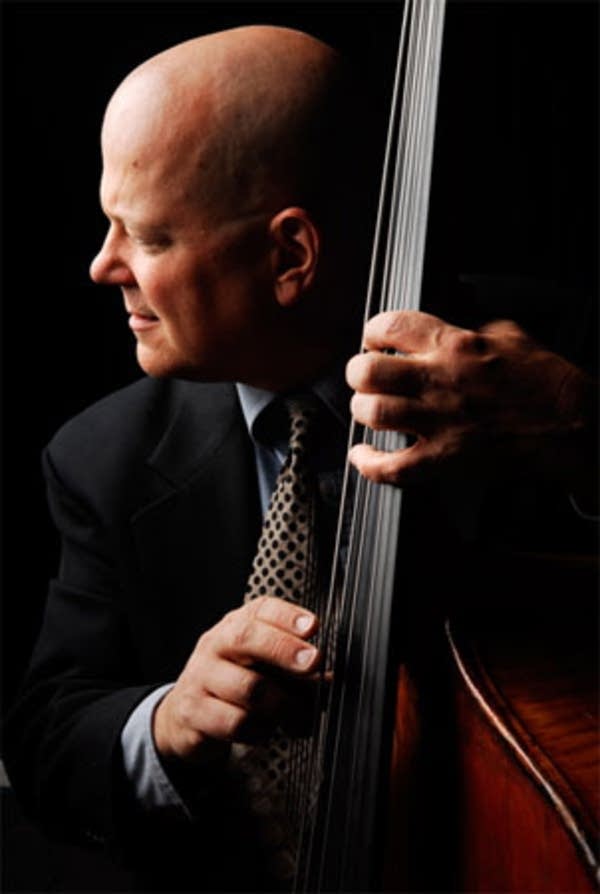The Twin Cities bass foundation
Go Deeper.
Create an account or log in to save stories.
Like this?
Thanks for liking this story! We have added it to a list of your favorite stories.

Gordon Johnson's colleagues often use words like rich, full and fat to describe his sound on the bass. For New York City pianist Frank Kimbrough, Johnson's playing conjures up a particular image.
"He's got a big sound that puts in my mind the idea of a big lion and his paws going down on the earth," Kimbrough said. "That's the sound of a great bass player to me, and I hear that in Gordy."

Kimbrough plays piano on a pair of tracks on Gordon Johnson's new CD, "GJ4." The disc is the latest in a series of piano trio collections, in which Johnson combines his bass playing with a variety of drummers and pianists from the Twin Cities area and out of town.
Johnson has been a professional bassist ever since joining trumpeter Maynard Ferguson's big band in 1975. He later toured the world with the Paul Winter Consort, blues guitarist Roy Buchanan and Chuck Mangione before getting off the road at the end of the 1980s and returning to his Twin Cities home.
Turn Up Your Support
MPR News helps you turn down the noise and build shared understanding. Turn up your support for this public resource and keep trusted journalism accessible to all.
Johnson may have inherited a bass playing gene. His late father Clifford was bassist with the Minnesota Orchestra for 47 years. His brother Jimmy plays bass with singer/songwriter James Taylor.
However, as a boy when he'd watch his father play in the orchestra, it was the flute that grabbed his attention.
"It's a really interesting game, to play music where everybody has something to say and everybody's really listening to each other."
"The principal flutist was Emil Opava and he played with great bravura, a lot of body English," Johnson remembered. "It was really exciting when he played his solo parts, and I thought, 'Man, I'd like to try that.' And so I took up the flute."
Johnson became an accomplished flute player and studied the instrument at the prestigious Eastman School of Music.
But all through high school and college, he was also playing electric bass and guitar in rock bands. And along with studying the flute at Eastman he was playing bass in the school's jazz band.
Johnson graduated as a flute major, yet he knew that he wasn't going to make that instrument his career.
"It was too much fun playing the bass in these jazz ensembles I was in," he said. "I eventually realized that I didn't really want to be in a symphony orchestra playing the flute."
But all of the time spent studying the flute wasn't a waste. Gordon Johnson says the flute has had a lasting influence on his approach to the bass.
"I spent so many years playing the lead line that it kind of ingrained itself in my brain," he said. "So now I can actually approach the bass as a melodic instrument, instead of just being the root foundation of the music."

Twin Cities drummer Phil Hey has performed with Gordon Johnson in many different bands over the years, and can recognize his bass playing after just a couple notes. He's also on all four of Johnson's piano trio CDs.
Hey says Johnson has an incredible sound, fabulous time, great feel and another quality that makes him special.
"Gordy plays for the music," Hey explained. "He plays for the group. He tries to make everybody else on stage sound the best that they can possibly sound. And that, to me, is the mark of a truly great musician."
Johnson's bass is the one constant on his four CDs. He plays with a revolving cast of musicians, some of whom had never met before.
For example, on his latest release, "GJ4," former Journey drummer Steve Smith and up-and-coming Twin Cities pianist Tanner Taylor are playing together for the first time.
Johnson says the two worked well together, and that's what he's enjoyed about making the discs.
"It's a great game," Johnson said. "It's a really interesting game, to play music where everybody has something to say and everybody's really listening to each other. That's the magic of jazz, I think."
Gordon Johnson says there's enough music left over from the "GJ4" sessions for a "GJ5" CD. Meanwhile, he's also keeping an eye on who'll be coming to town next that he can invite into the studio for a sixth volume.




